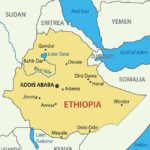Large-Scale Starch and Derivatives Producers Association (LSSDPA) has set a target revenue of at least N360 billion ($812m) per annum while pursuing one of its objectives, which is to double the amount of Cassava derivatives to at least 600,000 metric tons in five years so as to tighten the gap between supply-demand of cassava-based products.
Currently, the domestic production of cassava derivatives is about 300,000 metric tons, generating about N180 billion ($406m) in revenue annually.
In her keynote address at the inauguration of the association held in Lagos on Monday, December 12, 2022, the President of LSSDPA Mrs Oluyemisi Iranloye disclosed that such revenue will further conserve Nigeria’s foreign exchange, reduce Nigeria’s reliance on the import of cassava byproducts and create new job opportunities.
To generate a production output of 600,000 metric tons, Iranloye who is also the Chief Executive Officer of Psaltry Foods Limited stated that about 3 million metric tons of fresh cassava root would be planted annually on approximately 170,000 hectares of land. “That translates into an opportunity estimated to impact at least 10 million Nigerians in different host communities where the cassava derivatives producing factories are situated.
” Of course, the livelihoods of farm families will improve, boost rural development, and reduce urban migration
Besides, citing PriceWatercoopers report, she said the 3 million metric tons is just one-fourteenth of the estimated fresh root of cassava to be planted annually to meet the demand for cassava-based products. Cassava can be the bedrock of the Nigerian economy according to her if Nigeria can come together to harness its full economic potential.
Presently in Nigeria, there is domestic production of six cassava derivatives, which include starch, flour, ethanol, methanol, glucose, and sorbitol. We can expand the value chain to encompass indigenous production of vitamin C, biodegradable plastics, formaldehyde, hydrochloric acid, sodium silicate, and caustic soda…
Also, “we have gained success in streamlining the conversion of cassava wastes into animal feed, which studies show can replace corn in most animals’ diets.
“We can channel that same energy into biomass energy production i.e., conversion of agricultural wastes to energy, a massive potential area in which Nigeria needs to participate in its research and development, said.
The cassava processing industry generates significant waste that can be converted to electricity and steam, thus, creating clean energy for industries and thousands of homes, adding that with biomass electrification, we can establish a carbon credit system to offset our carbon emissions and sell carbon credits.
‘Clearly, cassava is no longer a crop for self-consumption; it is a crop that can shoulder the Nigerian economy. Imagine the growth of the economy if we can focus on the cassava value chain as regards improving access to finance, supporting cassava cultivation, increasing funding for agricultural development and research, and promoting domestic production of cassava-based products she said.
The reason for founding the LSSDPA she disclosed, is to create a strong synergy between the cassava value chain actors and stakeholders towards growing the cassava value chain, reducing the gap between the supply-demand of cassava derivatives, and increasing the Nigerian Gross Domestic products. (GDP) exponentially.
Therefore, she called on decision-makers and the cassava value chain actors to synergize on enhancing the cassava value chain for the greater good of everyone, stressing that Manufacturing companies will have quick and easy access to premium quality cassava derivatives needed for their manufacturing process.
In addition, boosting the production of Cassava derivatives will help create jobs for hundreds of thousands of unemployed youths, while stimulating rural development, helping alleviate poverty, enhancing food security, providing clean energy, and promoting Nigerian industrialization.
Iranloye considers Nigeria to be the greatest country in the world because it is the only country globally that possesses all the natural resources needed to survive. “Even Nigerians in the diaspora agree that no country nears the greatness of Nigeria regarding our natural resources.
“It is just for us to have a bond of understanding to foster the country’s growth just as the Large-Scale Starch and Derivatives Producers Association LSSDPA inaugurated today to enhance the Nigerian cassava value chain and build the Nigerian Economy,” she stated.
Also speaking, the Chairman LSSDPA Mr Rasheed Olakanmi Sarumi said one major goal of member companies is import substitution, which will go a long way in helping the economy as the associating companies are purely Nigerian and for Nigerians.
According to him, ” our production activities are bankable and I hope that financiers will come looking for us.
“We are a group of organizations operating within the Cassava Value Chain in the Agribusiness sector of the Nigerian economy.”
The association is pan-Nigeria and consists of registered businesses directly involved in the processing of cassava into any of its primary or derived products and have a factory that processes daily, a minimum of 50 tons of wet or dry cassava into any of the primary cassava product (Starch, High-quality cassava flour, Chips) or its derivative (methanol, Ethanol, Sorbitol, glucose syrup etc).
Its vision is to be a self-sustaining platform to provide a voice for Large-scale cassava starch and derivatives producers in the monitoring, regulation of activities and sustenance of interest by governments and the private sector to support positive action for activities in the cassava value chain.
The association’s objectives include: To promote and increasing the level of value addition to local cassava products to stimulate import substitution by major industrial users of starch and its derivatives up to 100percent in the medium to long term; stimulating and sustaining the interests and commitment of stakeholders (government/corporates) in the continuous growth of activities in the cassava value chain; to identify gaps in policies affecting the cassava value chain and products derived from cassava and proffer alternatives to policymakers that will enable the cassava value chain to play its vital role in national development among others.
Other stakeholders present at the launch include Fidelity Bank, Sterling Bank, First City Monument Bank, Nestle Foods Limited, and Nigerian Export Promotion Council among others.
ALSO READ FROM NIGERIAN TRIBUNE






